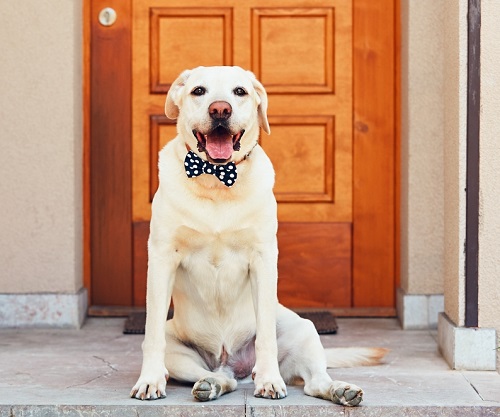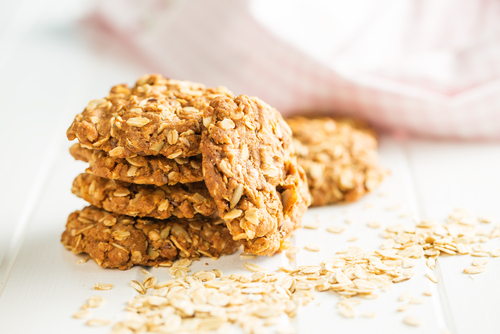Can Dogs Eat Snickerdoodles? Learn if these cinnamon delights are a woof-worthy treat or a paws-off cookie.
Can Dogs Eat Snickerdoodles? Prepare for an informative journey where wagging tails meet cinnamon-sugar bites. Learn about the potential health benefits and concerns of feeding this treat to your pets!
What are Snickerdoodles?

A Snickerdoodle is a type of cookie that has a soft and chewy texture with a slightly crisp exterior. It typically consists of a simple combination of butter, sugar, flour, and cream of tartar that gives it a distinct tangy flavor. Before baking, the cookies are rolled in a mixture of cinnamon and sugar, resulting in a sweet and cinnamon-spiced treat. People enjoy Snickerdoodles for their comforting taste and often pair them with a glass of milk or a hot beverage.
Check out Are Cheetos Safe for Dogs? here
Can Dogs Eat Snickerdoodles?
No, dogs cannot eat Snickerdoodles.
Snickerdoodles majorly contain ingredients like cinnamon, sugar, and butter, which can be harmful or unhealthy for dogs in large quantities. Cinnamon, in particular, can cause digestive issues and even be toxic to dogs in excessive amounts.
Additionally, the high sugar and fat content in Snickerdoodles can lead to weight gain, pancreatitis, or other health problems in dogs. It’s best to stick to dog-friendly treats specifically formulated for their dietary needs to ensure their well-being.
Are Snickerdoodles Good for Dogs—Potential Health Benefits
Snickerdoodles are not good for dogs. Hence, they do not provide any potential benefits for canine health.
While a small amount may not immediately harm them, the ingredients in Snickerdoodles can be problematic for dogs if consumed regularly or in large quantities. The sugar content can lead to weight gain, dental issues, and potential blood sugar spikes. The butter and high-fat content can contribute to pancreatitis and digestive upset.
Additionally, cinnamon, a common ingredient that is present in large amounts in these cookies, can irritate a dog’s gastrointestinal system. It is always best to stick to treats specifically made for dogs to ensure their safety and well-being.
Check out Can Dogs Eat Cinnamon Toast Crunch? here
Are Snickerdoodles Bad for Dogs—A Few Health Concerns

Yes, Snickerdoodles are unhealthy for dogs due to their ingredients and might pose several health concerns, including:
- High Sugar Content: Snickerdoodles are typically high in sugar, which can contribute to weight gain, obesity, and dental issues in dogs. Excessive sugar intake can also lead to imbalances in blood sugar levels.
- High-Fat Content: These cookies are loaded with butter or other high-fat ingredients. Consuming excessive amounts of fat can lead to pancreatitis, a potentially serious condition that causes inflammation of the pancreas.
- Cinnamon Toxicity: While small amounts of cinnamon are safe for dogs, consuming large quantities of cinnamon, as found in Snickerdoodles, can cause digestive upset and even be toxic to dogs. Cinnamon contains compounds that can irritate a dog’s digestive system and potentially lead to liver damage.
- Allergic Reactions: Dogs can have food allergies or sensitivities, and the ingredients in Snickerdoodles, such as wheat, dairy, and eggs, may trigger allergic reactions in some dogs.
How to Safely Feed Snickerdoodles to Dogs
While it’s best to avoid feeding Snickerdoodles to dogs if you still wish to offer a change in their taste buds, here are some guidelines to do so safely:
- Consult with a Veterinarian: Before introducing snickerdoodles into your dog’s diet, consult with your vet to ensure it won’t pose any health risks based on your dog’s specific needs and health condition.
- Offer a Tiny piece: Give your dog only a very small, bite-sized piece of snickerdoodle as a rare treat. Monitor their reaction closely to check for any adverse effects.
- Ensure it’s Plain and Minimal: Choose a plain Snickerdoodle without any additional toppings, fillings, or icing. Avoid ones with raisins, as they are toxic to dogs.
- Watch for Digestive Issues: After your dog has eaten the Snickerdoodle, observe them for any signs of digestive upset, such as vomiting, diarrhea, or discomfort. If any symptoms occur, contact your vet immediately.
- Explore Dog-Friendly Alternatives: Instead of Snickerdoodles, consider offering your dog safe and healthy treats specifically made for canines. There are numerous options available that cater to their nutritional needs.
Check out How to Treat Collar Sores on Dogs | Remedies and Precautions here
Types of Cookies Bad for Your Dog
There are several types of cookies that are generally considered bad for dogs due to their ingredients and potential health risks. Some examples include:
- Chocolate Cookies: Chocolate contains theobromine, which is toxic to dogs and can cause symptoms like vomiting, diarrhea, increased heart rate, and even seizures. Never feed your dog cookies or any other foods containing chocolate.
- Raisin Cookies: Raisins and grapes are toxic to dogs and can lead to kidney failure. Even a small amount of raisins can be harmful, so it’s important to keep any cookies containing raisins away from your dog.
- Nut-filled Cookies: Certain nuts, such as macadamia nuts, can be toxic to dogs and cause symptoms like weakness, tremors, and vomiting. Avoid cookies that contain nuts or nut butter.
- Cookies with Artificial Sweeteners: Some artificial sweeteners, like xylitol, can be highly toxic to dogs and cause a rapid release of insulin, leading to low blood sugar levels. Keep cookies with xylitol or other artificial sweeteners away from your dog.
- High-Sugar or High-Fat Cookies: Cookies with excessive amounts of sugar and fat can contribute to weight gain, obesity, and other health issues in dogs, including pancreatitis.
Types of Cookies Good for Your Dog

There are several types of cookies that can be enjoyed by dogs as a safe and tasty treat. However, it’s important to note that treats should be given in moderation and should not replace a balanced and nutritious diet. Here are some examples of cookies that can be suitable for dogs:
- Homemade Dog Cookies: You can make homemade dog-friendly cookies using ingredients such as whole wheat flour, oats, peanut butter (without xylitol), pumpkin, and carrots. There are numerous recipes available online that cater specifically to canine dietary needs.
- Commercial Dog Cookies: There are many commercially available dog cookies and treats made with dog-friendly ingredients. Look for options that are specifically formulated for dogs, free from harmful additives, and meet nutritional standards.
- Plain Rice or Oatmeal Cookies: Plain rice or oatmeal cookies, without added sugars or artificial sweeteners, can be given to dogs in small quantities as a treat. Ensure they do not contain any harmful ingredients like chocolate, raisins, or nuts.
Check out Are Croutons Safe for Dogs? here
Quick Takeaways
So Can Dogs Eat Snickerdoodles? No, these cookies are not suitable for dogs to consume due to the ingredients present in them. Always look for the ingredient list in any new food before including it in your dog’s diet. Ingredients that are toxic to dogs, such as chocolate, raisins, nuts, and artificial sweeteners, must be avoided.
Always consult with your veterinarian for personalized advice on treats that are suitable for your dog’s individual needs and dietary requirements. Remember, moderation is key when it comes to treating your furry friend!
FAQs
1. Can Dogs Eat Cinnamon Sugar Cookies?
No, you cannot feed cinnamon sugar cookies to dogs. Cinnamon is safe in small amounts but can cause digestive upset in some dogs. Additionally, the high sugar content in cinnamon sugar cookies can contribute to weight gain, dental issues, and potential blood sugar spikes in dogs. It’s best to opt for treats specifically made for dogs to ensure their well-being.
2. Is it Ok for Dogs to Eat Cookies?
While there are certain dog-friendly cookies available, the consumption of cookies by dogs should be approached with caution. Most traditional cookies, including those made for human consumption, contain ingredients like sugar, chocolate, raisins, nuts, and artificial sweeteners that can be harmful to dogs. These ingredients can cause various health issues, such as gastrointestinal upset, pancreatitis, toxicity, and weight gain.
